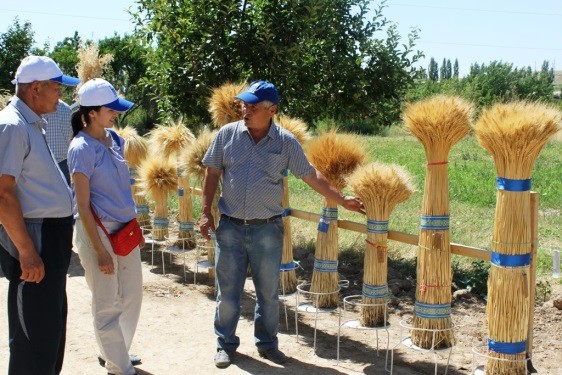
April 2015—For the last decade, Kazakhstani farmers have suffered from the adverse effect of climate change. Impacts include variable rain patterns and early spring droughts.
Farmers have been slow to adjust. Over the past three years, 60 percent of farmers in northern Kazakhstan have failed to reach traditional production levels because of climate variability. Often, the problem is a lack of familiarity with, or insufficient incentives to adopt, modern technologies.
A joint effort by USAID and the U.N. Development Program, the Climate Resilient Wheat project, has established experimental demonstration plots to showcase advanced wheat growing technologies that help farmers become resilient to climate variability. For instance, zero tillage technology conserves soil moisture and allows crops to maintain steady growth during the harsh drought season.
In addition, the project has contributed specialized weather forecasting software to the national hydro-meteorological service Kazhydromet, which helps provide exact weather forecasting data. Now, using the new software, forecasters are able to produce seasonal weather pattern predictions in a matter of seconds, which are then passed along to farmers.
The software tracks data going back 70 years to determine trends in climate changes. As a result of improved climate and weather data availability, farmers’ yields are improving despite the increased frequency of adverse weather and growing climate variability. For example, if farmers are informed about an upcoming drought season, they can leave residue from predecessor crops for mulch and snow retention to keep moisture in the soil or they can carefully select the right drought tolerant seeds. With access to accurate weather forecasts, farmers can determine the most optimal planting period and fully harvest yields well before an early freeze in autumn.
“In the future, if we have such reliable and accessible long-term weather forecasts, I can plan more efficiently my planting and harvest times,” said Igor Grishanov, head of the Abizher company.
Over the last two years, 45 farmers have actively cooperated with Kazhydromet to receive weather updates. Participating farmers demonstrated yields on average 20 percent better than farmers who did not participate in the program, which ran from 2012 to 2014.
Now, with the program’s effectiveness demonstrated, there are presently 70 farmers participating in the program from the Kostanay region. The project’s demonstration plots have been effective in building trust among farmers for new approaches, and making farmers comfortable to adopt new technologies.
“The technologies that have been demonstrated have effectively changed my farming principles, knowledge and attitude. I was able to increase my wheat crop productivity on each hectare of my land,” said Grishanov.
Kazakhstan serves as the bread basket for Central Asia and parts of South Asia. USAID’s programs, including the Kazakhstan Climate Change Mitigation Project, are helping this critical regional agricultural exporter adapt to the impacts of climate change, and ensure consistent levels of agricultural production.
LINKS
Follow @USAIDCtrAsia, on Facebook, on Flickr, on YouTube







Comment
Make a general inquiry or suggest an improvement.